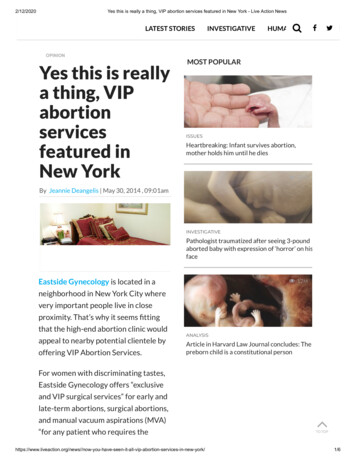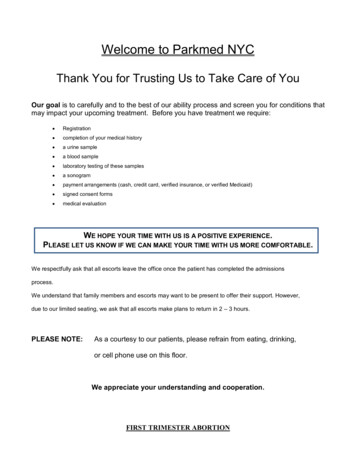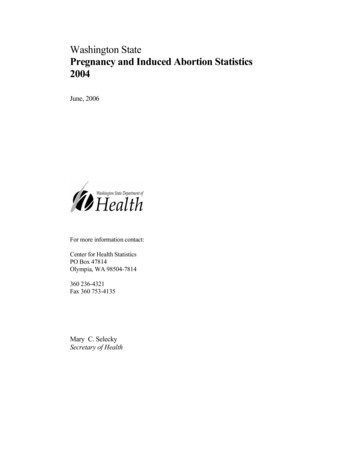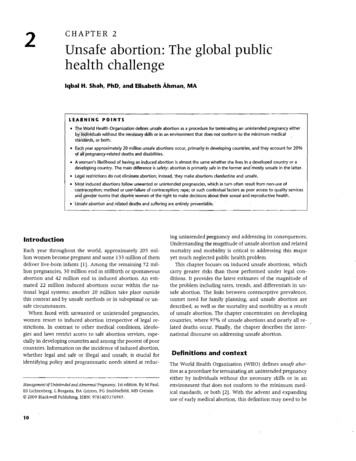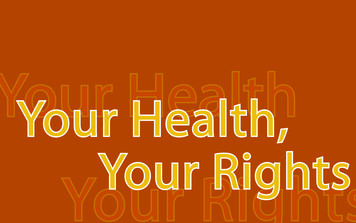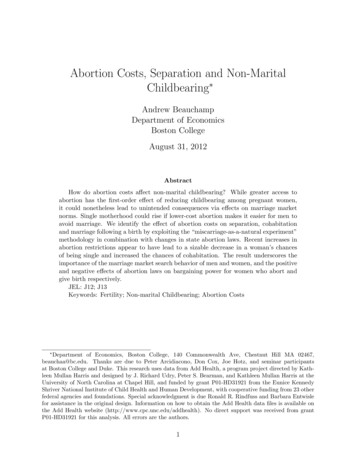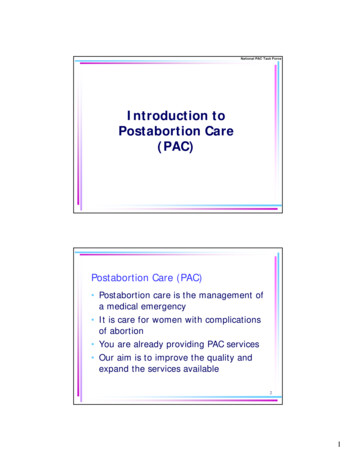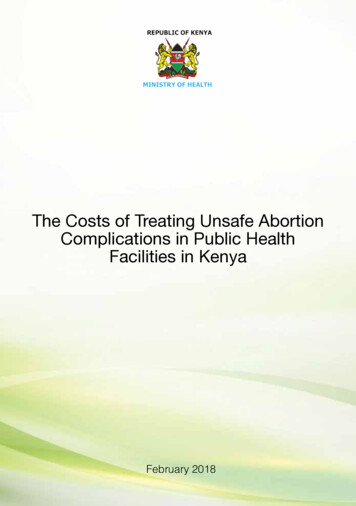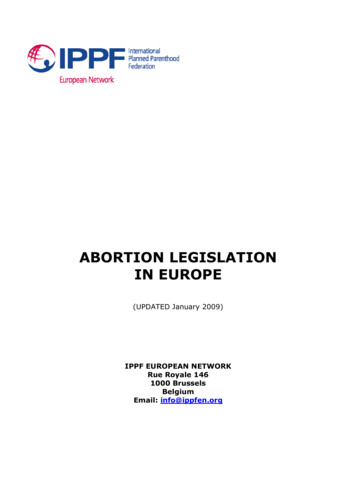
Transcription
ABORTION LEGISLATIONIN EUROPE(UPDATED January 2009)IPPF EUROPEAN NETWORKRue Royale 1461000 BrusselsBelgiumEmail: info@ippfen.org
CountriesAUSTRIA . 8BOSNIA and HERZEGOVINA . 12BULGARIA . 14CYPRUS. 16CZECH REPUBLIC . 18DENMARK . 20FINLAND . 26FRANCE . 28GEORGIA. 30GERMANY . 32GREECE . 34HUNGARY . 35ICELAND. 37IRELAND . 39ISRAEL . 41ITALY . 43KAZAKHKSTAN . 45KYRGYZSTAN. 47LATVIA . 49LITHUANIA . 51LUXEMBOURG . 53MACEDONIA (FYR). 55MOLDOVA . 58NORWAY . 61POLAND . 63PORTUGAL . 65ROMANIA. 67RUSSIAN FEDERATION. 69SLOVAK REPUBLIC. 71SPAIN . 73SWEDEN . 76SWITZERLAND. 78TAJIKISTAN . 80TURKEY. 82UNITED KINGDOM. 84UZBEKISTAN. 86GLOSSARY OF TERMS . 88January 20092
Notes1) The document is in its eighth edition. The previous one was compiled in February 2004. It has beenupdated following information received from IPPF European Network Member Associations (MAs)2) In DISPARITY IN THE APPLICATION OF THE LAW, and in COMMENTS the text is directly fromthe Member Associations (MAs).3) The exchange rate for the conversion into US was calculated at the time of the revision.AcknowledgementsIPPF European Network would like to thank all its Member Associations for their invaluable contributionsto this update.January 20093
ALBANIAAlbanian Center for Population and Developmentinfo@acpd-al.orgLEGISLATIONAbortion Law Nr 8045, 7 December 1995, “on the interruption of pregnancy”GROUNDS/GESTATIONAL LIMITSUp to 12 weeks: On request, in case a woman considers that a pregnancy causes psychological and social problemsUp to 22 weeks: For social reasons Rape or other sexual crimeNo Limit: Severe (incurable) malformation of the fetus If continuing the pregnancy and/or childbirth would put the woman’s life or health at riskREGULATIONS/CONDITIONSAbortion should be performed by a physician-specialist/obstetrician-gynaecologist, and can take placein public and private health institutions.Pre- and post-abortion counselling is obliged. The physician performing the abortion is obliged toinform women of family planning services and to advise them about contraceptive methods.In case a woman, after the pre-abortion counselling, repeals the request, she is asked by the physicianto confirm her request in writing. This confirmation should be done at least 7 days after her firstrequest. If the time span of 7 days surpasses the legal limits, the physician may decide to reduce it to2 days.Unmarried minors up to 16 need the consent of the person exercising parental authority or legalprotection. The request for an abortion should not be made in their presence.A health commission consisting of three physicians decides, after examination and consultation, toallow for an abortion on medical grounds (thus no limit as mentioned above).An abortion for social reasons (up to 22nd week) needs the approval of a commission of threespecialists (physician, social worker and lawyer).January 20094
METHODSTypes of abortion methods available in country are: Vacuum aspiration (electric or manual) Dilatation and Curettage Induction with Misoprostol (PG analogues) Sextio caesarean minorMedical abortion was introduced in Albania through a pilot project implemented in the Tirana MaternityHospitals. Although many Ob/Gyns use RU486 to provide medical abortion, it is not legalized. In theAlbanian Approved List of Drugs, RU486 is not included. Actually there is no amendment or lawapproved on medical abortion.COSTA total of lek 3.600 (US 40) for the abortion fee plus laboratory tests (incl. Ultrasound).In private clinics this sum is double.DISPARITY IN THE APPLICATION OF THE LAW: Although required by law, routine analyses are not regularly done before the abortion procedure. The reflection period (7 days – by law) is not respected, mostly because women are not informedabout their rights. Neither the social worker nor health practitioners inform women on this. Women pay “under the table” and give bribes to the doctors who perform the abortion. Obligatory pre- and post-abortion counselling is not always respected. Most abortions performed in private clinics are not reported and there are no standard reportingforms. There is no appropriate supervision plan in place for both private and public clinics. The clinicssupervision is not done on a regular basis. Almost half of private clinics do not comply with legal requirements regarding the needed surfaceand equipment. Women do not necessarily present an identification document at the clinic.COMMENTS: The 1995 law overturned the previous one whereby abortion was legally permitted only on limitedgrounds Abortion is not performed in the MA’s clinicsJanuary 20095
ARMENIAArmenian Association ‘For Family and Abortion is permitted since 1955GROUNDS/GESTATIONAL LIMITSUp to 12 weeks: On requestUp to 22 weeks: Social grounds (if husband died during woman’s pregnancy; if woman was deprived of maternal rightsduring pregnancy; divorce; rape) Medical grounds (such as tuberculosis, syphilis, HIV/AIDS, a malignant tumour, mental disorder orchronic alcoholism; underdeveloped reproductive system of teenager under-16) Family risk or diagnosed foetal malformationREGULATIONS/CONDITIONS Menstrual regulation (called mini-abortion in Armenia) is permitted up to 7 weeks of pregnancy. Women under age of 18 should obtain consent from parents or a lawful proxy or, if this is impossible,from a relevant medical commission. According to the MoH standards, abortion should be performed only by a licensed obstetriciangynaecologist and only in hospital conditions such as maternity homes and obstetrics/gynaecologicaldepartments in the hospitals or clinics with at least 15 beds and relevant license. MoH permits medicalabortions to be performed in the licensed out-patient medical facilities (so called Female’sConsultancies). Although registration of the abortion is mandatory, it is not always done. In order to ensure the quality of abortion services, the Government has issued regulations on abortionprocedures, which include a 4 hours period of stay after the intervention and family planningcounselling after the abortion. However, these regulations are not followed by the medicalpractitioners and not controlled by the MoH.METHODSAlthough medical abortion is legalized, Armenia is still in the process of running trials and registering thenecessary drugs. Mifepristone is not registered; Misoprostol is registered as a drug used to treat ulcers,but has not been registered as drug that can be used for medical abortion.Medical abortion can be performed out of the hospital in the licensed Female’s Consultations. However,many women self-induce abortion at home using Misoprostol (brand name is Cytotec) based on thephysician’s advice or experience of other women. Cytotec is generally used to treat ulcers and can beobtained in the pharmacies without prescription. One tablet of Cytotec costs around US 5-10.Most used methods:Surgical abortion via dilatation and curettage and electrical vacuum aspiration are the most commonlyused method of pregnancy termination.January 20096
COSTThe cost of a surgical abortion up to 12 weeks of gestation varies from clinic to clinic, between US 30and US 50 per procedure. All state clinics providing abortion services charge an official fee of 30,which almost equals the minimum wage.There are also additional unofficial, illegal payments, which range from US 20 to US 500, dependingon the gestational limit. The cost of an abortion is higher, if it is performed with anaesthesia, or if it isillegal. Both legal and illegal costs have considerably increased in the last 10 years.The cost of an illegal abortion significantly exceeds an average monthly salary. A social security systemin Armenia does not exist yet. Although there is a state program to provide services for free to poorpeople, most of the poor can’t access the program due to complex criteria and bureaucratic procedures.DISPARITY IN THE APPLICATION OF THE LAW: Abortion services are not available in rural areas or in some urban settings The poor and young unmarried women often perform self-induced abortion with a high risk of lifethreatening complications and consequences.COMMENTS: Regardless of the permissive legislation for the abortion and availability of national regulations onabortion services, there are several problems related to abortion services in the country. They includelack of access to abortion services for poor and young women, a poor quality of the abortion careprovided and a lack of post-abortion contraception. The quality of abortion services provided in health facilities is poor. Although the quality of abortioncare has never been assessed at the national level, the MoH is aware of the fact that abortion servicesare not of high quality and needs a lot of improvement and introduction of new technologies. Presently, the most commonly used abortion technique is dilatation and curettage. Manual vacuumaspiration is being used sporadically and only in private clinics in Yerevan. Mifepristone andMisoprostol are not registered in the country to perform medical abortion. An indicator demonstrating quality of abortion services is the level of post-abortion complications thatcontribute to women’s disability and death cases. As the NRHS (1998) showed complications afterabortion were experienced by 16% of the interviewed women. The quality of abortion is alsocompromised by a lack of post-abortion counselling provided by service providers. The study showedthat in 60% of cases, no family planning counselling after abortion was provided, and 75% of womencomplained about pain beyond comfort level during last abortion (NRHS, 1998). Access to safe abortion is an issue for low-income and young people who cannot afford to pay forservices or don’t have access to information about available services. Especially young unmarriedwomen are at risk of unsafe abortion due to social prejudice against premarital sexual relations.Parents are not capable to provide support and help to their children that are faced with an unwantedpregnancy. The causes lie in a traditional attitude of people to avoid talks on sexual topics betweenyoung and older generations. Even when parents are willing to help, very often they lack skills todiscuss sexuality issues with their children. As a result of compromised access to abortion services there are cases of unsafe self-inducedabortion. According to the National reproductive Health Survey (1998), at least 23.4% out of allreported miscarriages were due to self-induced abortion. Official statistics do not provide accurate andreliable data on rate of unsafe abortion in the country.January 20097
AUSTRIAÖsterreichische Gesellschaft für Familienplanung (ÖGF)office@oegf.atwww.oegf.atLEGISLATIONFederal Law 23 January 1974, effective in January 1975 (Bundesgesetzblatt, No. 60, 1974)GROUNDS/GESTATIONAL LIMITSUp to three months from completed implantation: On requestSecond trimester: Serious risk to physical health of women (that cannot be averted by other means)Risk to mental health of women (that cannot be averted by other means)Immediate risk to life of woman (that cannot be averted by other means)Serious foetal impairment (physical or mental)Woman is a minor (under 14 years)REGULATIONS/CONDITIONS Abortion must be performed by a physician after a previous medical consultation No physician is obliged to perform an abortion or to take part in it, except where it is necessarywithout delay to save the life of the pregnant woman from an immediately threatening dangerwhich cannot otherwise be averted. In public hospitals following examinations and tests are required: rhesus factor, ultrasound, HIV,lues, hepatitisMETHODSVacuum Aspiration is the most commonly used method. Medical abortion (Mifegyne) is not verycommon.The regulation for Mifegyne allows the use of the drug only in hospital and clinics, therefore medicalabortion can be performed only in hospitals. There are three private clinics specialised in abortion inVienna. They also offer medical abortion. In three provinces there are no public hospitals whichprovide abortions. In all provinces (except one) there are private clinics.COSTInduced abortion is covered by the (normal) health insurance State hospitals: 300 – 840(US 459-1285,20) Private abortion clinics: 350-450 (US 535,50-688,50) Private practitioners: 350-450 (US 535,50-688,50)January 20098
DISPARITY IN THE APPLICATION OF THE LAW: Due to conscientious objection from both medical personnel and hospital management, abortionfacilities are not readily available all over the country. According to the law, abortion can be performed up to 3 months after completed implantation, butin practice they are performed up to 12 weeks after Last Menstrual Period even though there is nolegal basis for this. According to the law, abortion can be performed by general practitioners and gynaecologists. Butthe regulation for Mifegyne allows the use of the drug only in hospital and clinics, therefore medicalabortion can be performed only in hospitals. There are three private clinics specialised in abortion inVienna. They also offer medical abortion. In three provinces there are no public hospitals whichprovide abortions. In all provinces (except one) there are private clinics. Abortion tourism takes place from West to East Austria. Between 100 and 200 women per year arestill going to the Netherlands to get a late second trimester abortion. After the 18th week it is hardlypossible to get an abortion in Austria.COMMENTS: It is believed that illegal abortion is not practised on any scale. Statistics are not available though.Public information on the availability of abortion services is very scarce.In a public hospital, the abortion will be registered, in a private clinic notVery few public hospitals are offering abortion at a reasonable price (app. 5 hospitals are offeringabortion for less than 350). It is difficult for women to get an abortion especially outside Viennaand outside other big cities Very few doctors perform abortions in private practice in rural areasJanuary 20099
on Laïque de Centres de Planning ingfamilial.netLEGISLATIONLaw on termination of pregnancy 3 April 1990National Evaluation Committee (Law of 13 August 1990)GROUNDS/GESTATIONAL LIMITSAbortion remains forbidden (art. 348, 350, 351, 352 of the Penal Code) but legalUp to 12 weeks after conception (or 14 weeks after Last Menstrual Period): If the pregnancy causes a ‘state of distress’ for the woman (– the law does not define the state ofdistress).No limit: ‘Serious’ risk to health of woman ‘Extremely serious and incurable disease’ of fetusREGULATIONS/CONDITIONS Can only be performed in a hospital/clinic by a doctorConsultation with a doctorCompulsory waiting period (6 days)“Unity of place”: first consultation and the abortion has to take place in the same clinic/hospitalCompulsory counselling on alternatives to abortion (adoption, keeping the baby)Parental consent for minors is not mentioned in the lawThe opinion of a 2nd doctor is requested in case of ‘serious’ risks to health of the woman or if the fetusis judged to be suffering from an ‘extremely serious or incurable disease’January 200910
METHODSMedical abortion is legal in Belgium and part of the Belgian abortion legislation. No separate law is set forit. In Flanders, the cost is the same as for vacuum aspiration.When Mifégyne became available on the Belgian market, a Decree (7 May 2000) was issued regulatingthe conditions for the use of Mifégyne. For the abortion client, this technical document does not haveimplications.Misoprostol is available on the market as a drug for stomach and gastric ulcers. The instruction leaflet forCytotec (Misoprostol) does not mention abortion as an indication for its use, but mentions pregnancy as acontra-indication. Again, this does not have implications for the abortion client.Medical abortion is allowed up to 7 weeks from Last Menstrual Period (LMP).Vacuum Aspiration up to 14 weeks from LMP.Fourteen per cent of all abortions in Belgium are medical abortions. This figure is relatively low because ofthe compulsory 6-day waiting period between the first consultation and the abortion. Consequently, thechoice between a medical and surgical abortion is only available for those women that are very early intheir pregnancy and quick to decide whether they wish an abortion.COSTSince December 2001, abortion is reimbursed if performed in a private abortion clinic that has signed anagreement with the national institute for social security (INAMI/RIZIV). The contribution women have topay is very limited ( 3.08 or US 4). This only applies to women who are regularly insured. Womenwithout social security insurance, have to pay up to 200 in the private abortion clinics.Abortions performed in hospitals or one-day clinics/policlinics of hospitals are not fully reimbursed.Depending upon the setting, women have to pay: Hospitals (single room): 75-225 (US 97-290) One-day clinics/policlinics: 32-70 (US 41-90)DISPARITY IN THE APPLICATION OF THE LAW:In reality, abortion is available on demand of the woman up to 12 weeks after conceptionCOMMENTS: The law is quite liberally interpreted. Most abortions are performed in private abortion clinics (nonprofit organizations), on demand of the woman. The law is quite cumbersome/heavy: compulsory waiting period without exceptions, compulsorycounselling, compulsory unity of place, no second trimester abortions on demand of the woman, noreimbursement for second abortion treatments abroadJanuary 200911
BOSNIA and HERZEGOVINAAssociation for Sexual and Reproductive Health - XY NFederation of Bosnia-Herzegovina:Law of 7 October 1977 which proclaims that “it is a human right to decide on the birth of children”Republika Srpska:Proclaimed a new Law on conditions and procedures for pregnancy termination. This Law was adoptedby Parliament of Republika Srpska in March 2008. In this Law gestational limits are the same as in theold Law (described below). New issues added in this Law are the provision of counselling and advice towomen and men. In this Law, counselling before and after abortion have become obligatory. Anothermajor change is the adaptation of the penalties to new national currencies.GROUNDS/GESTATIONAL LIMITSUp to 10 weeks of pregnancy: On requestAfter 10 weeks of pregnancy: Risk to life and health of woman Risk to physical or mental health of child to be born Rape or other sexual crimeAfter 20 weeks of gestation: To save the life or health of a womanREGULATIONS/CONDITIONS Abortions must be performed in a hospital or another authorized health-care facility If the woman is a minor, consent of her parents or guardian is required Women above 16 years who are employed don’t need parental consent for termination of pregnancyup to 10 weeks and if the termination will not directly endanger her life After 10 weeks of pregnancy, special authorization by a commission, composed of agynaecologist/obstetrician, a general physician or a specialist in internal medicine, and a social workeror psychologist is required. The woman can appeal to the Commission of Second Instance if the Commission of First Instancerejects her requestMETHODSThe most common method is Vacuum Aspiration followed by ultrasound to ensure there are no residues.Medical abortion is still not used in the country. The drugs needed are neither registered nor available.January 200912
COST Abortion in Clinical Centres costs KM 130 (66 EUR) for all patients whether they are insured or not Abortion in Health Centres costs KM 100 (51 EUR) for all patients whether they are insured or not The cost of an abortion in private clinics ranges from KM 150-400 (77-205 EUR)DISPARITY IN THE APPLICATION OF THE LAW:According to article 13, women’s health services keep a special record about terminations ofpregnancies. In practice, record keeping about termination of pregnancies is totally neglected. Thereare no data neither on State, Federal or Cantonal level. Some private clinics hide the fact that they areperforming abortions. Consequently, they do not report on the abortions performed.COMMENTS:January 200913
BULGARIABulgarian Family Planning and Sexual Health Association ee No. 2 of 1 February 1990GROUNDS/GESTATIONAL LIMITSUp to 12 weeks of gestation: On request - If there is no disease that can lead to complications which could threaten the healthand the life of the woman after the abortion (those diseases are officially listed)Up to 20 weeks of gestation: Medical grounds: when the woman suffers from an illness which during pregnancy or at birth mayendanger her health and life, as well as that of the offspringUp till end of pregnancy: Severe foetal malformation Risk to the life of the womanREGULATIONS/CONDITIONS Abortions on request should be performed in specialized obstetrical hospitals and clinics, as well asin the obstetrical departments of general hospitals. Abortions are permitted in both state andprivate clinics, but not in private cabinets. The abortion must be performed by a Ob./Gyn. doctor only, applying local or general anaesthesia In the majority of cases – bigger cities – doctors are obliged to give information about contraception Pre- and post-abortion counselling/care is desired Gynaecological/pelvic examination is required. In case of history of some of the listed diseases isreported, laboratory tests required. Minimum number of lab test: blood counts, blood group (RHincl.), urine Incapacitated women need the consent of their legal representatives or guardians. Parental consent required for those aged under 18 An abortion on medical grounds must be based on a decision taken by a specially establishedmedical committee in the district or city hospitals, the obstetrical hospitals and clinics of the highermedical institutes. If the committee decides that no abortion should be performed, this decision canbe appealed within 7 days to a specialized committee appointed by the Minister of Health and SocialCare.COST Free of charge for under aged (16), for women over 35 and for all women on medical grounds andfor women who are pregnant as a result of rape. For the officially registered as socially weak womenis free of charge as well. From BGN 40 up to 300 (EURO 20-150) for the othersJanuary 200914
METHODSMost common methods are Vacuum Aspiration and Dilatation and CurettageMedical abortion drugs are not registered hence illegal.DISPARITY IN THE APPLICATION OF THE LAW:There is no considerable disparity reportedCOMMENTS: In the last ten years there is a stable decrease of the abortion rateA wide range of contraceptive methods is available in the countryDistance hampers access of rural women to abortionJanuary 200915
CYPRUSFamily Planning Association of Cyprus ISLATIONCriminal code of Cyprus (sections 167-169 and 169A) as amended in 1974 (Law No 59) and in 1986(Law No 186)GROUNDS/GESTATIONAL LIMITS Risk to life of the pregnant woman If the pregnancy would cause physical, mental of psychological damage to the woman (or to anyexisting child she may
on the gestational limit. The cost of an abortion is higher, if it is performed with anaesthesia, or if it is illegal. Both legal and illegal costs have considerably increased in the last 10 years. The cost of an illegal abortion significantly exceeds an average monthly salary. A social security system in Armenia does not exist yet.


